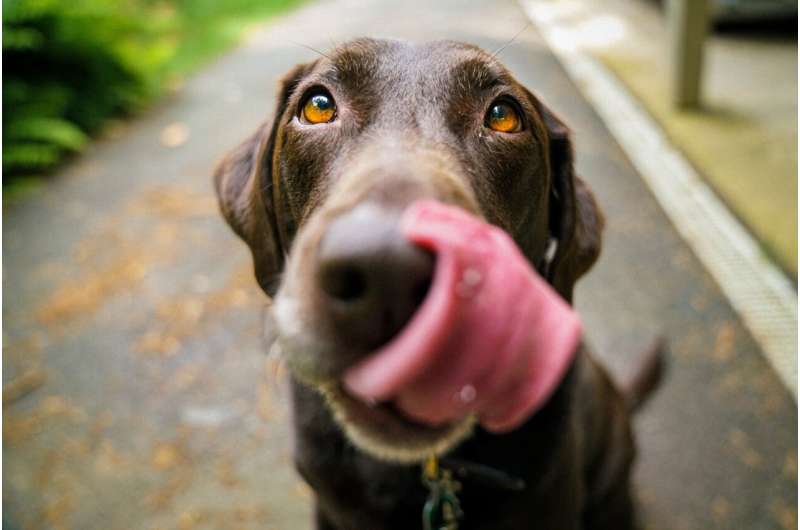This article has been reviewed according to Science X's editorial process and policies. Editors have highlighted the following attributes while ensuring the content's credibility:
fact-checked
trusted source
proofread
Feeding dogs raw meat increases the risk of antibiotic-resistant E. coli, finds study

Feeding dogs raw (uncooked) meat increases their risk of excreting E. coli that cannot be killed by a widely used antibiotic—ciprofloxacin—researchers at the University of Bristol have found from a study of 600 healthy pet dogs.
E. coli, which can cause food poisoning, is also the U.K.'s most common cause of urinary tract and bloodstream infections, which can be life-threatening. Ciprofloxacin belongs to a group of antibiotics called fluoroquinolones, which are used to treat a range of bacterial infections in humans and animals. The World Health Organization classes these antibiotics among the highest-priority critically important antibiotics.
The study, published in One Health, looked for ciprofloxacin-resistant E. coli carried in the intestines of 600 healthy pet dogs. The research team asked the dog owners to complete a survey that provided details about their dog, the dog's diet, the environments the dog walked in and if the dog had been treated with antibiotics.
The microbiology data along with the survey data enabled statistical analysis, which showed that feeding uncooked meat to dogs was the only significant risk factor associated with excretion of these resistant bacteria in the dog's feces. This work supports other published studies demonstrating associations between dogs being fed raw meat and excreting resistant E. coli.
In the U.K., reduced ciprofloxacin use by GPs has led to a decrease in ciprofloxacin resistance in E. coli from human infections. There has also been an almost total cessation of the use of fluoroquinolones to treat farmed animals in the U.K. However, fluoroquinolone use, and resistance remains at very high levels around the world.
Dr. Jordan Sealey, Research Associate in the School of Cellular and Molecular Medicine (CMM), who carried out the research, said, "Our aim was not to focus on raw dog food, but to investigate what might make a dog more likely to excrete resistant E. coli in its feces. Our study found a very strong association between excreting ciprofloxacin-resistant E. coli and feeding dogs a raw food diet."
Matthew Avison, Professor of Molecular Bacteriology in CMM, who led the study, explained, "Raw meat—whether intended for human consumption after cooking or sold as raw dog food—is likely to be contaminated with antibiotic-resistant E. coli. Cooking kills the bacteria and good hand hygiene reduces the immediate risk of these bacteria being swallowed and getting into a person's intestines.
"Choosing to feed a dog raw meat means a person almost certainly has to handle the raw meat, and our research is clear that raw feeding also means pet owners are likely to be interacting with a pet that is excreting resistant E. coli."
Dr. Sealey added, "Individual measures to reduce the risk of resistant bacteria being excreted by dogs include changing to a non-raw food diet or sourcing good quality raw meat that can be cooked, and then cooking it. Most raw food sold for consumption by dogs is not of a quality that can be cooked, and can cause a serious health hazard to dogs if cooked.
"Choosing to feed a dog meat from animals raised on farms in the U.K., or other countries with very low usage of critically important antibiotics in farming, may also decrease the risk of them eating resistant bacteria with their dinner."
Professor Avison concluded, "As part of our response to the emerging crisis of antibiotic resistance, further incentive should be given to companies joining the raw dog food industry to source meat from farms with appropriate antibiotic usage policies, and to test meat for resistant bacteria before selling. Stricter limits should be set on the numbers of bacteria allowed in meat that is sold to be eaten uncooked than in meat sold to be cooked prior to eating."
E. coli are found in the intestines of people and animals quite normally and can be passed between them, usually through poor domestic hygiene, e.g., after using the toilet or handling food contaminated with fecal material, including uncooked meat. When dogs excrete resistant bacteria into the environment and home, there is the potential for these bacteria to be passed on to their owners and other people.
Once a person swallows some E. coli, these bacteria can sit in their intestines for years before causing an infection. There are hundreds of thousands of urinary tract infections caused by E. coli in the U.K. every year, as well as thousands of bloodstream infections which frequently lead to life-threatening sepsis. When E. coli is resistant to important antibiotics like ciprofloxacin, infections are more difficult to treat, meaning patients are more likely to be hospitalized and die.
More information: Jordan E. Sealey et al, One health transmission of fluoroquinolone-resistant Escherichia coli and risk factors for their excretion by dogs living in urban and nearby rural settings, One Health (2023). DOI: 10.1016/j.onehlt.2023.100640
Provided by University of Bristol





















